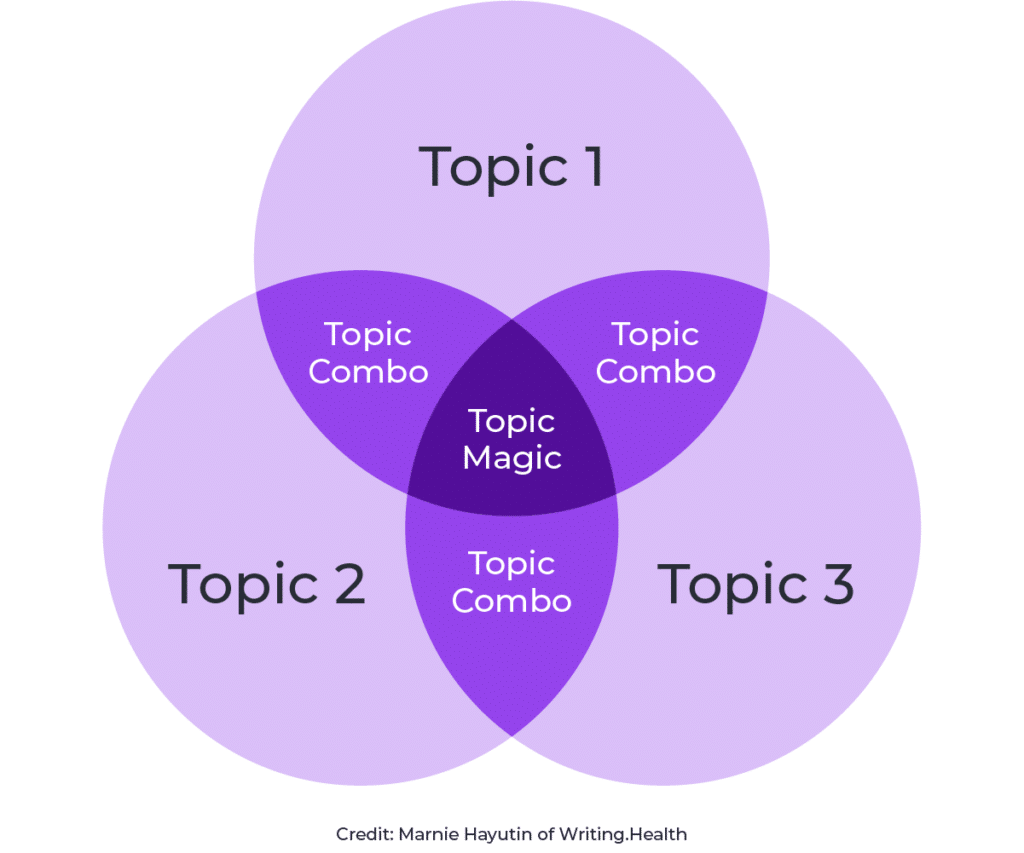Staying consistent in your brand voice is a critical component of how you write for social media, for thought leadership content, for product descriptions, and for your site’s homepage.
Sometimes, we stray from what makes sense for us (our brand) to talk about. We might have the urge to be more creative and less constrained, or we may be trying to play to a social media or search engine algorithm.
Whatever the reason, we leave our audience confused when we switch the theme of our content.
I recently had the chance to speak to Marnie Hayutin of Writing Health on the first episode of The Health Connective Show, and she gave some great advice for topic selection when it comes to your personal and company brands.
Topic Selection
Marnie advised that companies need to pick out three high-level topics. For example, Marnie talks about healthcare, marketing, and writing.
There’s loads to say about any one of these topics, and you could go a hundred different ways with the content.
But it’s not just about picking out topics.
Brands need to look for ways to combine at least two of those high-level topics for any piece of content it publishes. In Marnie’s case, she could talk about marketing and healthcare but not just healthcare on its own. (Bonus points for hitting all three topics in the same piece of content!)
As you can see, there’s still a wide opportunity to find content by combining topics like “healthcare” and “marketing.” By keeping those topics broad enough, you don’t paint yourself into a corner and end up having to constantly repeat yourself.

Personal Brand
I think personal brands are where people tend to have the least discipline on what they share or publish.
For a personal brand in medtech, we have to first focus on our primary audience. Are you trying to communicate to physicians? To fellow marketers? To sales people and/or distributors?
Whoever you pick, you want to establish consistency so your audience comes to know you for a specific solution. For example, you can make it clear that sales people can look to you for relevant product information and can reach out with questions. In addition to that overall message, you can also share resources that speak to customers’ pain points.
In the midst of that valuable content, you wouldn’t want to derail that trust by talking about something completely off-topic.
My one caveat to this is that we have to leave room for people to see who we are beyond our work role. The occasional post that includes a family member or time spent at your hobby or something that reveals more about you as a person is an incredible touchpoint, but that is the exception and not the norm.
Corporate Brand
If people have a tough time showing discipline with personal brands, the exact opposite is true with corporate brands.
Corporate social media and websites run the risk of coming off as dull or too sales-y.
By selecting relevant high-level topics, your company has the chance to write about more than product announcements and trade show appearances. I realize there’s a great deal more care needed, but companies can share their views and values beyond their products.
If the topics are healthcare, innovation, and technology, then a company can talk about the regular commitment it makes to investing in the next generation of scientists. It can regularly point to great innovators to say that this is something the company cares about. (This goes hand in hand with Marnie’s comments about tying your high-level topics to your core messages as a company.)
Simplify in a Noisy World
Yes, staying consistent does reduce the amount of topics you can consider, but your audience already has a lot going on. The more streamlined your message can be, the more likely people will be able to recall you for the topics most important to your business.
Michael spends a great deal of time with the healthcare industry both professionally and personally, which gives him the perspective of what stakeholders on either side of the care equation need.
He began coding in 2008 and subsequently shifted his attention entirely to online marketing. Michael completed his MBA in 2018, focusing on the intersection of healthcare and marketing.

